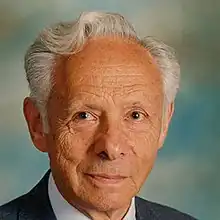Anthony Epstein
Sir Michael Anthony Epstein CBE FRS FMedSci (born 18 May 1921)[1] is a British pathologist and academic. He is one of the discoverers of the Epstein–Barr virus, along with Yvonne Barr and Bert Achong.[2][3][4][5][6][7][8][9]
Anthony Epstein | |
|---|---|
 | |
| Born | Michael Anthony Epstein 18 May 1921 |
| Nationality | British |
| Education | St Paul's School |
| Alma mater | Trinity College, Cambridge Middlesex Hospital Medical School |
| Occupation | Virology |
| Known for | Epstein–Barr virus |
| Awards | Paul Ehrlich and Ludwig Darmstaedter Prize (1973) Royal Medal (1992) |
Early and personal life
Epstein was born on 18 May 1921,[10][11] and educated at St Paul's School in London,[12] Trinity College, Cambridge, and Middlesex Hospital Medical School.
In 2006, Epstein was awarded a D.Sc. from Bristol. Epstein turned 100 in May 2021.[13][14] He is a Patron of Humanists UK.[10]
Career
Epstein was Professor of Pathology, 1968–1985 (now professor emeritus), head of department, 1968–1982[15] at the University of Bristol.[16] In 1979 he was elected a Fellow of the Royal Society of London and was its vice-president[1] from 1986 to 1991. He was awarded its Royal Medal in 1992.[17] Epstein was awarded the CBE in 1985,[18] and knighted in 1991.[1] He was a fellow of Wolfson College, Oxford, from 1986 until 2001, and has been an honorary fellow since 2001. Epstein was also a founding Fellow of the Academy of Medical Sciences in 1998.[19]
Burkitt lymphoma studies
Epstein was the first person to propose that Burkitt's lymphoma was a cancer caused by a virus. Upon hearing a lecture given by Denis Parsons Burkitt in 1961 about this newly described cancer, Epstein changed his research focus from cancer causing viruses in chickens to searching for a viral origin of Burkitt's lymphoma.[20] After more than two years of working with tumour cells from Burkitt's patients and subsequently working to isolate a virus from them, the Epstein–Barr virus was finally discovered in February 1964.[21]
References
- "Anthony Epstein". Royal Society. Archived from the original on 17 November 2015. Retrieved 25 October 2021.
- Bornkamm, G. W.; Delius, H.; Zimber, U.; Hudewentz, J.; Epstein, M. A. (1980). "Comparison of Epstein–Barr virus strains of different origin by analysis of the viral DNAs". Journal of Virology. 35 (3): 603–618. doi:10.1128/JVI.35.3.603-618.1980. PMC 288854. PMID 6252328.
- North, J. R.; Morgan, A. J.; Thompson, J. L.; Epstein, M. A. (1982). "Purified Epstein-Barr virus Mr 340,000 glycoprotein induces potent virus-neutralizing antibodies when incorporated in liposomes". Proceedings of the National Academy of Sciences of the United States of America. 79 (23): 7504–7508. Bibcode:1982PNAS...79.7504N. doi:10.1073/pnas.79.23.7504. PMC 347368. PMID 6296836.
- Gaston, J. S.; Rickinson, A. B.; Yao, Q. Y.; Epstein, M. A. (1986). "The abnormal cytotoxic T cell response to Epstein–Barr virus in rheumatoid arthritis is correlated with disease activity and occurs in other arthropathies". Annals of the Rheumatic Diseases. 45 (11): 932–936. doi:10.1136/ard.45.11.932. PMC 1002022. PMID 2878645.
- Epstein, M. A.; Morgan, A. J. (1983). "Clinical consequences of Epstein–Barr virus infection and possible control by an anti-viral vaccine". Clinical and Experimental Immunology. 53 (2): 257–271. PMC 1535689. PMID 6309441.
- Rickinson, A. B.; Finerty, S.; Epstein, M. A. (1982). "Interaction of Epstein–Barr virus with leukaemic B cells in vitro. I. Abortive infection and rare cell line establishment from chronic lymphocytic leukaemic cells". Clinical and Experimental Immunology. 50 (2): 347–354. PMC 1536694. PMID 6295671.
- Rickinson, A. B.; Crawford, D.; Epstein, M. A. (1977). "Inhibition of the in vitro outgrowth of Epstein–Barr virus-transformed lymphocytes by thymus-dependent lymphocytes from infectious mononucleosis patients". Clinical and Experimental Immunology. 28 (1): 72–79. PMC 1540876. PMID 193663.
- Yao, Q. Y.; Rickinson, A. B.; Gaston, J. S.; Epstein, M. A. (1986). "Disturbance of the Epstein-Barr virus-host balance in rheumatoid arthritis patients: A quantitative study". Clinical and Experimental Immunology. 64 (2): 302–310. PMC 1542331. PMID 3017620.
- Epstein, M. A.; Randle, B. J.; Finerty, S.; Kirkwood, J. K. (1986). "Not all potently neutralizing, vaccine-induced antibodies to Epstein-Barr virus ensure protection of susceptible experimental animals". Clinical and Experimental Immunology. 63 (3): 485–490. PMC 1577551. PMID 3011324.
- "Professor Sir Anthony Epstein CBE FRS". Humanists UK. Retrieved 25 October 2021.
- "Sir Anthony Epstein". Wolfson College, Oxford. Archived from the original on 13 October 2020. Retrieved 25 October 2021.
- Transactions of the Medical Society of London, Vol. 117 (2000), p. 66.
- EBV Association: Sir Antony Epstein.
- "The 100th birthday of Prof. Sir Anthony Epstein". EAHP. 11 May 2021. Retrieved 31 October 2021.
- Who's Who: Epstein, Sir (Michael) Anthony.
- "Sir Michael Anthony Epstein". Oxford Reference. Retrieved 25 October 2021.
- "Royal Medal - Award winners". Royal Society. Archived from the original on 22 December 2015. Retrieved 25 October 2021 – via Google Drive.
- The Palgrave Dictionary of Anglo-Jewish History (2011), p. 258.
- "Epstein, Anthony". Academy of Europe. Archived from the original on 7 November 2017. Retrieved 25 October 2021.
- McGrath, Paula (6 April 2014). "Cancer virus discovery helped by delayed flight". BBC News, Health. Retrieved 4 November 2015.
- Epstein, A. (2012). "Burkitt Lymphoma and the discovery of Epstein–Barr virus". British Journal of Haematology. 156 (6): 777–779. doi:10.1111/j.1365-2141.2011.09008.x. PMID 22233499. S2CID 27417152.